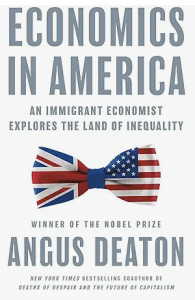I really enjoyed reading Angus Deaton’s Economics in America: an immigrant economist explores the land of inequality. It’s a collection of essays regarding different aspects of the economy, centred on issues of inequality, and also concerning the discipline of economics itself. Many of the essays originated in his ‘Letters from America’ for the Royal Economic Society newsletter, now updated and reorganised. But they are models of clarity and accessibility, and the book would be an ideal read for students, or just people who want to understand better the economic mess we’re in – we, and particularly the US.
For the author’s righteous anger about the deep seated inequalities in America, from historic racial inequalities to the stitch up of citizens by the monopolistic health and pharma industries, or by the successful lobbying of politicians by business, shines out from every page. Many of the chapters cover some aspect of this, and quite a few on the Affordable Care Act and the opioid crisis – one of the factors behind Case and Deaton’s now-classic work on ‘Deaths of Despair’.
In one essay there is a nice tribute to the late Tony Atkinson. I didn’t know him, but it is hard to think of an economist spoken of with more affection by those who did, and his work on inequality and economic welfare was foundational. (Our recent symposium on welfare economics was inspired by him.) Deaton points out that in his Inequality: What Can Be Done (an excellent book too) Atkinson argued that innovations ssuch as self-driving cars or wearables should be vetted for social desirability before being licensed for sale: “As with much else that Tony wrote, I predict this idea will become widely discussed in the near future.”
The book concludes with reflections on economics itself. Deaton writes: “The discipline has becom unmoored from its proper basis, which is the study of human welfare. Lionel Robbins famous definition of economics – the allocation of scarce resources among competing ends – was a wrong turn, a terrible narrowing of scope.” Citing Hilary Putnam, he argues that economics should be a ‘reasoned and humane evaluation of social wellbeing’. The final line: economists need to spend more time with philosophers. I agree.
This is a great read. Highly recommended.


Well Hillary Putnam was a Maoist for a fair bit of time, so I am a bit sceptical of his practical competence in the ‘reasoned and humane evaluation of social wellbeing’.
Dear Diane, I am a chemical engineering student, just finished reading Material World by Ed Conway and found your website by chance while I was searching the literature for any relation between sulfuric acid production and economic output. And also by chance, found your book “The Weightless World”. This will be my next read after the Material World, and thank you so much for sharing it online. I also think your website is very resourceful. Have a nice day
Thank you!